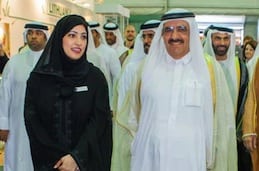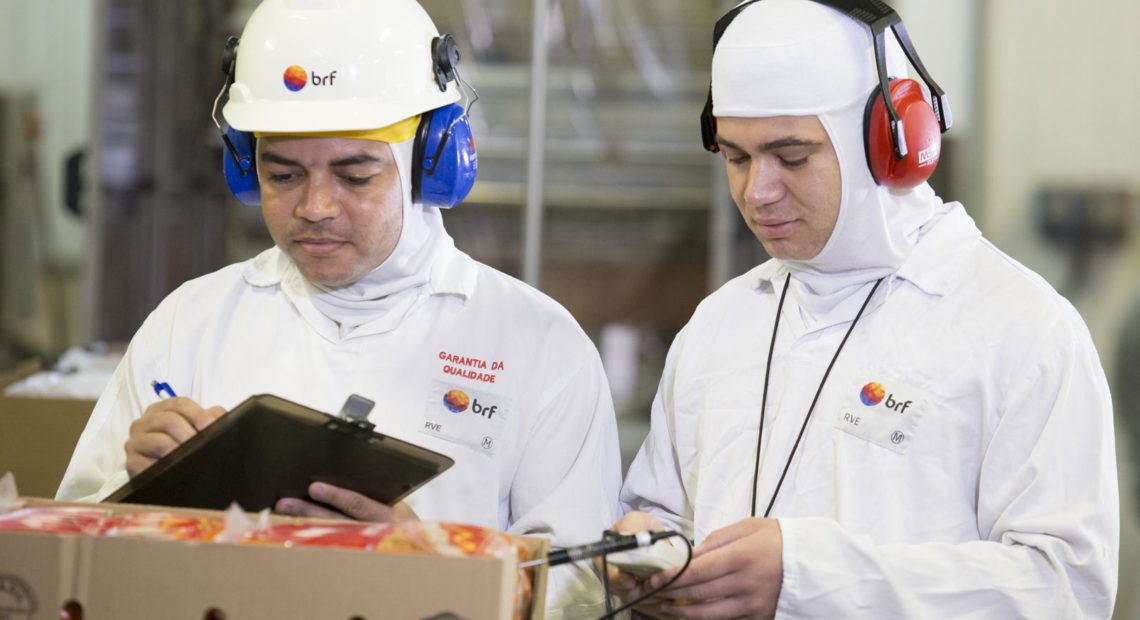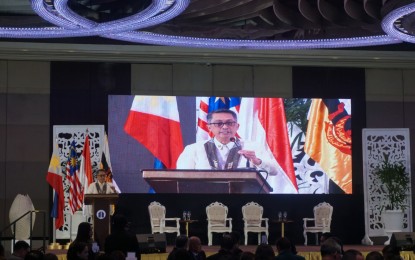Value of food consumption in the UAE expected to have reached Dhs28.2bn in 2012

Shaikh Hamdan Bin Rashid Al Maktoum, Deputy Ruler of Dubai and UAE Minister of Finance, and other officials during the opening of Gulfood on Monday.
Abu Dhabi: ?Gulfood 2013 was opened on Monday in Dubai with the participation of 110 countries participating, representing food producers, manufacturers and suppliers from their respective countries in a show to facilitate billions of dollars in trade for these states.
“The importance of Dubai as a key trading hub for the global food industry is highlighted by the arrival of a number of country leaders, government ministers and top-level delegations scheduled to attend Gulfood 2013, the world’s largest annual food trade show, opening on 25th February at the Dubai World Trade Centre,” said Gulfood 2013 in a statement.
Taking part in the exhibition is a great number of government ministers from countries from Australia, Argentina, Canada, Denmark, France, Germany, Korea, Lithuania, Northern Ireland, Sri Lanka, the UK and the USA.
Hilal Saeed Al Marri, CEO of Dubai World Trade Centre (DWTC) and Director General of Dubai Tourism and Commerce Marketing (DTCM) said: “Dubai now plays a pivotal role in the global food industry from a number of perspectives, not least because the city hosts what has become the most important annual food trade event in the world.”
Al Marri added: “While Gulfood has attracted more and more exhibitors every year from a growing number of countries, this year’s exhibition will welcome more government ministers and country delegations than ever before. This is a clear indication of the stature and importance of Gulfood in elevating Dubai’s position as the region’s leading gateway for trade between East and West.”
Gulfood said that the global food and beverage production industry is one of the fastest growing sectors worldwide, valued at Dh20.6 trillion in 2013. With demand in the GCC expected to rise significantly — fuelled by population growth, higher per capita income, and increasing tourism numbers — food imports to the region will increase by as much as 100 per cent to Dh194 billion by 2020.
Hamad Al Buamaim, Director General, Dubai Chamber of Commerce and Industry (DCCI), said: “The importance of the food and beverage sector for the growth and development of the UAE’s economy. With the value of food consumption in the UAE expected to have reached Dh28.2 billion in 2012,” adding that it is forecast this would increase to Dh32.6 billion in 2013.
Al Buamaim added: “The UAE food consumption has risen considerably in recent years and is projected to grow in line with rising populations and affluence. This presents a number of opportunities within the food sector.
He pointed out that there are opportunities for partnerships with food producers in Africa, using Dubai as a manufacturing and distribution base serving the emirates, GCC and wider Mena region.
Rashid Ahmad Al Teneiji, Director of Government Communications at the UAE Ministry of Foreign Trade, said: “The UAE’s food exports, which totalled Dhs15.8bn in 2010 increased by 10 per cent to reach Dh17.5 billion in 2011.”
Al Teneiji added that Gulfood contributes significantly to this growth by not only providing promising business opportunities to the global food industry but also proving to be an excellent platform for UAE companies to do business abroad.
“The presence of a dedicated UAE pavilion for the first time at the show is an indication of the country’s development in the food and beverage industry as it moves up the value chain,” said Al Teneiji.
Australian Ambassador to the UAE and Qatar, Pablo Kang, stressed that for Australia, the Middle East and North Africa market represents one of the largest export destinations for goods and services, and is considered a priority trade market.
“Australia’s food exports into the Mena region are now greater than those to China and significantly higher than exports to Japan and other Asean nations,” said Kang.
He added: “The UAE is Australia’s largest food export market in MENA valued at $642 million, larger than the size of exports to India. In 2012, food exports to Mena totalled approximately $3.3 billion and this continues to grow at a substantial rate on yearly basis.”??UAE invests in other countries
Due to its arid climate and scarcity of arable land, the UAE heavily depends on imports for its basic commodities and other food, a report issued by the ministry of foreign trade.
The UAE also adopted the mechanism of conducting agricultural investments in other countries — especially in the Arab world and African continent — in order to help assuage its food deficit, the report showed.
“The most significant of these investments was carried out in Sudan, where the UAE has agricultural investments on a 900 acres-large area spanning over several states, the most important of which is the 40 acres Zayed Al Khair Project south of the capital Khartoum,” according to the report.
Ministry of economy said that the UAE has seen a steady rise in food imports.
“Food consumption in the UAE had been growing at the rate of 12 per cent per year and; therefore, the demand for food staples had increased by 30 per cent,” said the ministry of economy.
The ministry explained that one of the main reasons for the increasing demand “was the UAE’s steadily growing population”.
Ministry of foreign trade’s report revealed that over the past five years, the country’s foodstuff foreign trade was worth Dh295 billion, achieving a total growth of 84 per cent, with food imports constituting the largest share (Dh194 billion — 66 per cent) of the total amount.
Ministry of economy’s statistics shows that the major trading partners to UAE in food and beverage were as per market share: India 18 per cent, China 12 per cent, USA 10 per cent and Australia 8 per cent and others by 39 per cent.
The UAE top agriculture imports were fats and oils, wood products, meat products, prepared foods and vegetables products.



